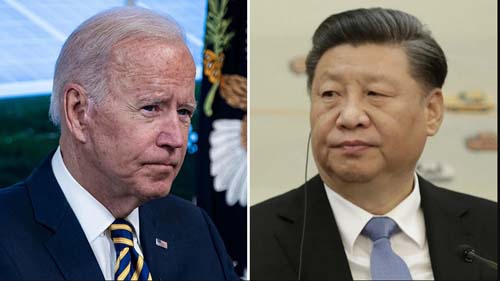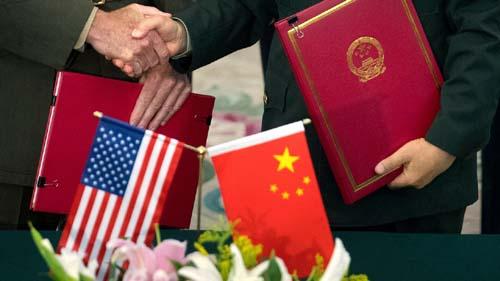
US urged to show sincerity to fix US-China relations
Chen Qingqing and Wan Hengyi
Munich: At the request of the US side, China’s top diplomat Wang Yi held an unofficial engagement with US Secretary of State Antony Blinken this week on the sidelines of the Munich Security Conference (MSC) in Germany, where the Chinese official urged the US side to rectify its wrong approach as Washington’s handling of the recent airship incident has damaged China-US relations.
Chinese observers believe that from the readout of the US state department, Washington has barely displayed any sincerity in fixing the US-China relations, which have been further damaged by its hysterical overreaction and abuse of force in handling the recent Chinese balloon incident. It also reflects that the Biden administration has little flexibility in its China policy amid a toxic domestic political environment in the US.

Such an unofficial, short engagement is a sign of the tough situation the two countries are facing now, observers said, who predict that tensions in the bilateral relations are unlikely to ease in the short term, especially when the US is entering an election cycle.
Wang, director of the Office of the Foreign Affairs Commission of the Communist Party of China (CPC) Central Committee, stated China’s solemn position on the airship incident, and told Blinken that the US should face up to and resolve the damage inflicted on bilateral relations after the US abused its force and shot down a Chinese unmanned civilian airship that strayed into US airspace due to force majeure, according to a statement on the website of the Chinese Foreign Ministry on Sunday.
On Saturday, Wang blasted Washington’s reaction to the balloon incident, calling its handling of the matter “hysterical,” and an apparent violation of international norms and conventions.
It is the US who is in fact the number one country in terms of surveillance and reconnaissance, whose high-altitude balloons illegally flew over China multiple times. The US is in no position to smear China, the Chinese Foreign Ministry spokesperson said on Sunday in a comment on the Wang-Blinken interaction.

What the US needs to do is demonstrate sincerity and face up to and resolve the damage that its abuse of force has done to China-US relations. If the US continues to dramatize, hype up or escalate the situation, China will surely respond by doing what is necessary. All consequences arising thereof shall be borne by the US side, the spokesperson said.
In a summary of the meeting in Munich, Ned Price, a spokesperson for the US State Department, said Blinken “directly spoke to the unacceptable violation of US sovereignty and international law by the [People’s Republic of China] high-altitude surveillance balloon in US territorial airspace, underscoring that this irresponsible act must never again occur.”
“The US appears to have been proactive in seeking dialogue with China, but it has not showed any sincerity, nor reflection on the solutions to deal with the issue,” Lü Xiang, a research fellow at the Chinese Academy of Social Sciences, told the Global Times, on Sunday.
Following the balloon incident, Blinken announced to postpone his first official trip to China, US media reported in early February. The Chinese side had not confirmed this visit. Despite China repeatedly explained to the US that the Chinese civilian airship flew into the US airspace due to force majeure, Blinken said in an interview with NBC that the US had not overreacted in shooting it down, adding that “there was no doubt that the device’s aim was to carry out surveillance activities.”
“Previously, China and the US could expect to ‘sit down and talk,’ but under the current atmosphere of China-US relations, they could ‘only stand and talk,'” Lü said, noting that Washington still shows no good will to promote a proper settlement of the issue.
The balloon incident was mentioned in at least three public occasions during the MSC, including when Wang met Pakistani Foreign Minister Bilawal Bhutto, when he responded to questions about China-US relations following his keynote speech, and when he met Blinken informally. The Chinese diplomat stated China’s solemn position on the matter, and even asked, “there are many balloons floating above the Earth every day, is the US going to shoot them all down?”
From the information released and the readouts of the two sides, some Chinese observers said although holding the conversation is better than no dialogue at all, as it will help reduce concerns over instability rising globally, it is hard to believe the two sides would reach any consensus.
“China has made clear that it wants the US side to change course, which reveals that unless the US changes its provocative policy toward China, China-US relations are unlikely to get back on track,” Sun Chenghao, a research fellow from the Center for International Security and Strategy at Tsinghua University, told the Global Times on Sunday.
Besides the balloon incident, the US Secretary of State also pointed the finger at China-Russia relations. Blinken told the US media that China is “considering providing lethal support to Russia” while warning the Chinese diplomat that “there would be consequences if China provides material support to Russia or assistance with systemic sanctions evasion.”
On the Ukraine issue, China adheres to principles and stays committed to promoting peace talks, and has been playing a constructive role. The China-Russia comprehensive strategic partnership of coordination is built on the basis of non-alliance, non-confrontation and non-targeting of third countries, and is within the sovereign rights of two independent countries, Wang told Blinken, according to readout of Chinese foreign ministry.
“We never accept the US’ finger-pointing or even coercion targeting China-Russia relations. The US, as a major country, is supposed to work for a political settlement of the crisis instead of fanning the flames or profiteering from the situation,” Wang said.
“The so-called warning to China is unreasonable, reckless and meaningless, which won’t play any constructive role on the matter,” Lü said.
During the unofficial engagement, Wang urged the US side to respect history and the facts on the Taiwan question, abide by political commitments, and act upon the statement of “not supporting Taiwan independence.”
Some observers believe that Blinken’s visit to China, if goes ahead, is expected to slightly ease the US-China relations, which have been further worsening in recent years, but the postponement of Blinken’s visit announced by the US following the balloon incident makes the prospects of recovery in bilateral relations dim.
“Although Washington has not announced to cancel Blinken’s reported visit, it will be difficult for China-US relations to stabilize in the coming months,” Li Haidong, a professor at the Institute of International Relations at the China Foreign Affairs University, told the Global Times on Sunday.
In a few months, the US will enter the election cycle. The Biden administration may think more about how to deal with relations with China from an electoral perspective, and China-US relations do not rule out another round of “volatility,” Li said.
